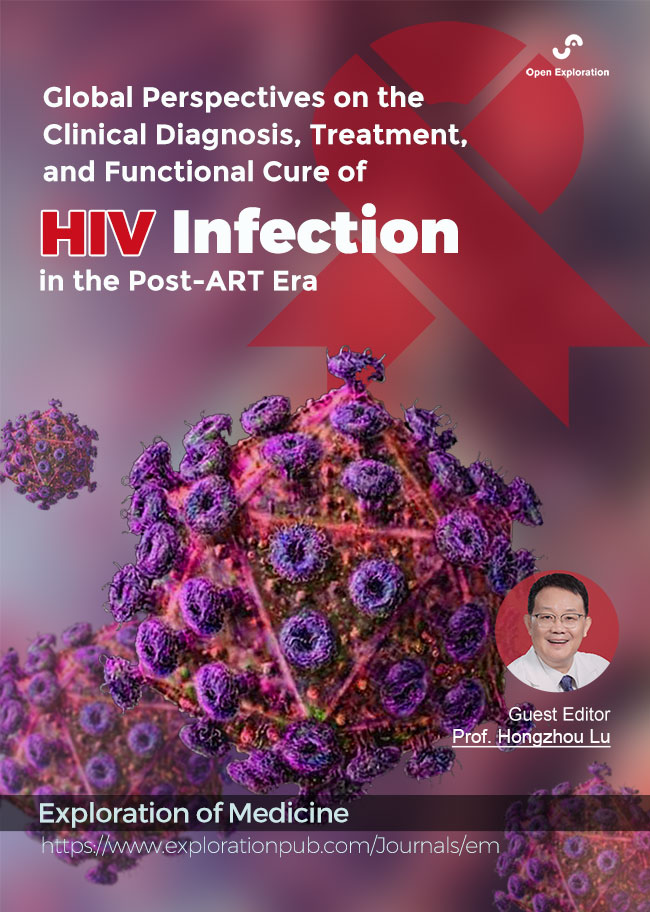
Global Perspectives on the Clinical Diagnosis, Treatment, and Functional Cure of HIV Infection in the Post-ART Era
Guest Editor
Prof. Hongzhou Lu E-Mail
Full Professor, Department of Infectious Diseases, Shenzhen Third People's Hospital; President, Shenzhen Third People's Hospital; Director, National Clinical Research Center for Infectious Diseases, Shenzhen, China
Research Keywords: Infectious diseases, HIV, AIDS
About the Special lssue
Background of the Topic
By the end of 2022, there were 39 million people living with HIV/AIDS globally, with 29.8 million individuals receiving cART (combination antiretroviral therapy). While cART has significantly extended life expectancy, HIV/AIDS management has entered the post-ART era, necessitating multidisciplinary and comprehensive care strategies across the lifespan of the disease.
One of the emerging global challenges in long-term HIV care is the increased risk of cardiovascular diseases, including dyslipidemia, hypertension, and atherosclerosis. These comorbidities are often exacerbated by antiretroviral therapy, making cardiovascular disease risk management an essential aspect of holistic HIV patient care. Proper management of cardiovascular health, along with addressing metabolic disturbances such as dyslipidemia, is now crucial in reducing morbidity and improving the quality of life for HIV patients.
Around the world, the integration of care across diverse healthcare systems, including collaboration between medical and nursing staff, remains a challenge. Coinfections with hepatitis C virus (HCV), which share transmission routes with HIV, complicate treatment protocols. Global research now increasingly focuses on functional cures and vaccine development, alongside diagnostic and therapeutic strategies for coinfections, cardiovascular disease risk management, and other systemic conditions.
This special issue seeks to bring together cutting-edge research and clinical insights from international experts to address these emerging challenges in HIV care, including managing cardiovascular disease risks and metabolic disorders, and to provide solutions that integrate HIV treatment with broader health management.
Scope of the Special Issue
This special issue aims to explore the multifaceted challenges and advancements in the diagnosis, treatment, and long-term management of HIV infection in the post-ART era, with a specific focus on multidisciplinary care and the integration of HIV management with broader health concerns.
Key topics include:
Cardiovascular disease risk management in HIV patients, addressing the rising incidence of dyslipidemia, hypertension, and other metabolic disorders associated with long-term antiretroviral therapy. This includes studies on interventions to mitigate these risks and improve overall patient outcomes.
Antiviral treatment strategies and drug resistance in HIV, including novel approaches to therapy and prevention of resistance.
Functional cure research for HIV, examining the latest scientific advancements and clinical trials aimed at eradicating the virus or achieving long-term viral suppression without continuous therapy.
Coinfection management, particularly with hepatitis C (HCV), focusing on clinical outcomes, treatment protocols, and challenges in managing patients with concurrent infections.
Clinical care and nursing research for HIV patients, emphasizing comprehensive, patient-centered care, including occupational protection for healthcare providers and quality control in patient care.
Global perspectives on HIV management, sharing insights from different regions and healthcare systems to foster international collaboration and understanding of the evolving HIV landscape.
This special issue encourages original research articles, clinical trials, reviews, and expert perspectives that highlight innovative solutions and strategies for enhancing the quality of life for HIV patients, while addressing the challenges of managing comorbidities such as cardiovascular disease and coinfections.
Keywords: HIV/AIDS, cardiovascular disease risk, metabolic disorders, coinfection, multidisciplinary management, HIV treatment strategies, epidemiology, prospective intervention